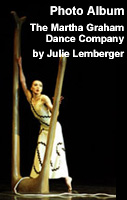






Go
back to Flash Reviews Flash Review Journal, 7-6: The Soul
Returns to Hip-Hop By Josephine Leask As a Londoner, I was really excited about the Hip-Hop Theater Festival which ran for three weeks in June at P.S. 122, because of the opportunity to see Hip-Hop in its place of origin, New York. Hip-Hop theater, a genre that has hardly emerged in the UK, is contemporary theater that is performed through words, beats and rhythm that is relevant to black audiences who have grown up within Hip-Hop and know it as a way of life. Another person who was equally excited was London-based Hip-Hop artist Jonzi D, who crossed the Atlantic to be part of this festival. For Jonzi D, bringing Hip-Hop to New York was like "dragging coals to Newcastle," to use a rather hackneyed English expression. Jonzi is a MC, dancer, choreographer, poet and rapper from East London. He bridges the world of Hip-Hop and contemporary dance, and is highly respected in both camps. With a two-year fellowship awarded to him by the Arts Council of England (ACE) and a touring schedule which takes him around the world, he has become a prolific artist. But it has taken years of hard work, working within a community that has been ignored and ghettoized, that has gotten Jonzi to where he is today. His background was unusual in that while he was rapping and being a B-boy on the streets and in clubs he decided to train at London Contemporary Dance School, keeping it a secret from his rapper colleagues at the time, who associated contemporary dance with white sissies in tights. Jonzi abandoned the tights, but used his training and crafted it into his unique brand of Hip-Hop theater, which draws on an extensive repertoire of movement. The show that Jonzi brought to New York, Lyrikal Fearta, consists of a series of acts, or ballads, which draw on the experience of a young black working class male in London. In several lyrically poetic and revealing solos, Jonzi gives his perspective on issues such as the English education system, which teaches history from a white colonial perspective, the racism inherent in the police, politicians and the white British establishment, and the feelings of displacement felt by people of color in the UK. In another solo he tells a dramatic and humorous tale of inner conflict -- of whether to play by the rules or violently break them in unleashed self expression. He raps about temptations that come his way such as his best mate's 'fit' girlfriend, or being given a fat joint to smoke in the street, or committing acts of vandalism at a concert. In a sinister duet about police brutality, Jonzi partners a dancer who is dressed as a cop and has the body language of a fascist skin head. In another piece which is a comment about black on black violence and lack of trust among black males, he is joined by other members of his company. In a series of walks and postures, they check each other out with hostility and confusion, mirroring each other's moves, or getting into fights. While Jonzi celebrates his black brothers and sisters, he also comments on the rifts within the world of Hip-Hop, as well as its capitalization and the 'whitening' of its image. A charismatic performer, Jonzi recounts his ballads in a mixture of cockney rhyming-slang and rap which reference an eclectic range of subjects such as Shakespeare, politics, black history and popular culture. Words pour from his mouth in rhythmical phrases, each one more expressive than the last, and are complimented by movement and sound -- an artistic array of sampling and scratching by Jonzi's in-house DJ. While "Lyrikal Fearta" is not primarily about dance, it is theater in which dance and movement play a very large part. Jonziās choreography is based on a mixture of gestures, postures, breaking and popping, and rather than performing isolated break dance tricks, he integrates them into his unique movement style, which follows his text in a spontaneous flow. In his final sketch, Jonzi recounts a graphic tale of cultural displacement. He searches to find his homeland, where he will escape the racist's hostility of East London, stopping off in various countries in which he imagines his roots to be Granada, then Jamaica, America (as the home of Hip-Hop) and Africa. Each country is wittily depicted through dance, music and local dialects. However each is equally hostile to him because he is culturally 'the other'. Finally he comes to the realization that just because he is black and his ancestors and family originated in those countries, it doesn't mean to say that he, essentially an English boy, is welcome in them. Some of Jonzi's references and language are lost on the New York audience, and it made me aware of the cultural differences on either side of the Atlantic, which runs through mainstream society as well as that of Hip-Hop. However Jonzi gets his agenda across so forcibly through his communicative performance style that he could be understood by any racial group. What was revealing in the light of the work of the other American Hip-Hop artists was that Jonziās work, which was representative of London Hip-Hop, seemed more politically edgy, more provocative, ironic and in your face. He doesnāt soften up his act, or pander to a white audience, but is as explicit and direct as he needs to be. Half way through the show, Jonziās MC walks on stage, to check out the audience and warm-them up with a bit of 'freestyle' improvised rapping. Likewise, the end of the performance becomes a freestyle arena, with the company and members of the audience taking turns to display their skills, thus melting boundaries between the spectator and performer. Hip-Hop theater erases many of the boundaries which white traditional theater imposes, as so much of it has been devised outside the restraints and conventions of the theater. Like many rap artists, Jonzi is a commentator on style, politics and culture, and especially on Hip-Hop culture. Much of Hip-Hop is self referential as that is a way of keeping it alive. He criticizes the violence within Hip-Hop, takes the piss out of the macho trigger-happy man, and also bemoans the lack of solidarity amongst black brothers. Jonzi is an artist who is trying to keep his art form underground, and trying to keep it black. As he questions during one of his acts, what has become of Hip-Hop when "Niggers call their black brothers and sisters niggers, whites call themselves niggers, and children have guns". Jonzi aims to spend his ACE fellowship money on broadening links with Hip-Hop theater around the world and bringing it to many more audiences. He is also committed to expanding the black presence within the dance world, which, certainly in Europe, is painfully white. From what I saw of the other performances at the Festival, each one carried a very clear message, as well as defining what Hip-Hop theater was, and displaying the integration of Hip-Hop techniques break-dancing, sampling, graffiti art, rapping, and Hip-Hop style within theater conventions. For example, Hip-Hop Theater Junction's "Rhyme Deferred", directed by Kamilah Forbes, was a play about the underground versus the commercialization of Hip-Hop. The story adopts the form of a Cain and Able parable, the downfall of a Puff Daddy type, who had made it big with a record label, but canāt make it any longer as he has lost his roots, and forgotten what 'freestyle' is. His impoverished brother, however is far more spiritually connected with the soul of Hip-Hop, and struggles against its capitalization. An intelligent comment on the danger of Hip-Hop being appropriated by the commodity market and loosing its black authenticity and spiritual identity, this play was brilliantly performed, again with an exuberant energy that I found with all the events in the festival. Full Circle presented a refreshing work by a group of feisty young performers with heaps of attitude and energy, who investigated the overlap between Latino and Hip-Hop culture. While this was more a light-hearted display of skill rather than a politically thought provoking play, the company nevertheless got its view across on matters such as police brutality and solidarity between cultural communities in the urban jungle. Much to the delight of many women in the audience, Full Circle's B-girls proved their feminine strengths in the dance arena, addressing the male dominance of this area of Hip-Hop. This evolving Hip-Hop theater makes for fluid theater that integrates movement, rhythm and language seamlessly and which is both self-referential and outward looking. It is theater that challenges traditional techniques, broadens the horizons of Hip-Hop without selling out, and makes it accessible without making it bland. It teaches Hip-Hop audiences to expect more than just the macho athletic headspins, which while impressive donāt tell us as much about this rich and wonderful art form as when it is integrated into theater which explores political, economic and gender issues of the society which produces it. Hip-Hop theater includes the audience, asking them to be active rather than passive, in a way that 'white' theatre rarely does. It is electrically charged as it is about contemporary themes and the elements of free style and improvisation keep it fresh, and extremely engaging for young audiences. Hip-Hop theater teaches us a lot about the world we live in, and if you are not from the Hip-Hop world you need to be educated.
Josephine Leask is a dance writer and performer. She recently moved to New York from London, and is currently working at the Village Voice and free-lancing for other NY and European publications. She is a correspondent for Dance Theatre Journal (London) and Ballet-Tanz International (Berlin).
|
|||||||



